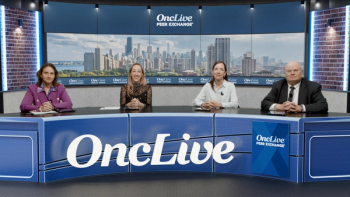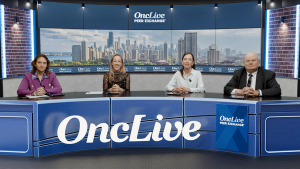Articles by Virginia Kaklamani, MD

Panelists discuss key updates from the past year regarding HR+/HER2– early breast cancer (eBC), emerging research that could transform treatment approaches, and the role of new biomarkers in patient identification, stratification, and predicting CDK4/6 inhibitor responses; they also highlight studies on the horizon that may further refine treatment strategies and offer closing clinical pearls for diagnosing and managing early-stage breast cancer.

Panelists discuss their approach to sequencing surgery, radiation, and systemic therapies for early-stage breast cancer patients, emphasizing the guiding principles of treatment sequencing and how individual patient factors influence decisions; they also highlight the importance of multidisciplinary coordination, identifying key specialists, ensuring alignment on diagnosis, risk assessment, and treatment goals, and the critical role of including the patient in these discussions.

Panelists discuss how common adverse events (AEs) with CDK4/6 inhibitors in HR+/HER2- early breast cancer (eBC) vary based on treatment and patient population, with strategies for mitigating toxicities, adjusting dosing, and monitoring labs to ensure treatment continuation; they also address approaches to dose reductions, promoting treatment adherence, educating patients about toxicity management, and balancing efficacy, quality of life, and side effect risks, particularly for high-risk patients with no or low nodal involvement.

Panelists discuss how differences in trial designs, including inclusion criteria, dosing, and end points, influence clinical decision-making in the use of CDK4/6 inhibitors for HR+/HER2– early breast cancer (eBC), with a focus on the NATALEE trial’s analysis of patients with no or low nodal involvement, and how recent expanded approval of ribociclib for high-risk node-positive and node-negative eBC patients guides the identification of ideal candidates based on clinical factors.

Panelists discuss how the NCCN guidelines for risk stratification in HR+/HER2– early-stage breast cancer (eBC) guide clinical decision-making, exploring real-world adherence to these guidelines, the complexity of risk stratification in various clinical scenarios, and the role of clinical factors, biomarkers, and advanced testing methodologies (including RSClin N+, next-generation sequencing [NGS], fluorescence in situ hybridization [FISH], immunohistochemistry [IHC], and circulating DNA [ctDNA]) in defining “high-risk” patients and guiding treatment strategies.

Panelists discuss how the NCCN guidelines for risk stratification in HR+/HER2– early-stage breast cancer (eBC) guide clinical decision-making, exploring real-world adherence to these guidelines, the complexity of risk stratification in various clinical scenarios, and the role of clinical factors, biomarkers, and advanced testing methodologies (including RSClin N+, next-generation sequencing [NGS], fluorescence in situ hybridization [FISH], immunohistochemistry [IHC], and circulating DNA [ctDNA]) in defining “high-risk” patients and guiding treatment strategies.

Panelists discuss how the NCCN guidelines for risk stratification in HR+/HER2– early-stage breast cancer (eBC) guide clinical decision-making, exploring real-world adherence to these guidelines, the complexity of risk stratification in various clinical scenarios, and the role of clinical factors, biomarkers, and advanced testing methodologies (including RSClin N+, next-generation sequencing [NGS], fluorescence in situ hybridization [FISH], immunohistochemistry [IHC], and circulating DNA [ctDNA]) in defining “high-risk” patients and guiding treatment strategies.

Panelists discuss how HR+/HER2– early-stage breast cancer (eBC) is characterized by hormone receptor–positive, HER2-negative tumors, focusing on unmet patient needs, the goals of treatment in this setting, and the critical timing for discussing recurrence risk with patients.

A panel of experts offer future perspectives in HR+ breast cancer.

A panel of experts offer perspectives in sequencing ADC-Based therapies in HR+ breast cancer.

A panel of experts discuss ADC-based treatment strategies in HR+ Breast cancer.

A panel of experts discuss treatment advancements targeting the PI3K/AKT pathway in HR+ Breast Cancer.

A panel of experts discuss navigating 2L treatment strategies.

A panel of experts offer perspectives in navigating treatment strategies with CDK4/6 inhibitors.

A panel of experts discuss treatment updates in regards to CDK4/6 inhibitors.

A panel of experts discuss the potential of individual tumor sequencing with bespoke testing methodologies.

A panel of experts give perspectives on optimizing biomarker testing in Advanced HR+/HER2- Breast Cancer.

A panel of experts discuss advancements in adjuvant therapy for early-stage breast cancer.

Expert breast oncologists examine adjuvant therapy approaches for early-stage hormone receptor-positive breast cancer, emphasizing the distinct treatment strategies and outcomes observed in pre- and post-menopausal patient populations.

Leading oncologists explore optimal biomarker testing strategies for early-stage breast cancer, examining the comparative advantages of tissue and liquid biopsies to guide personalized treatment decisions.

Virginia Kaklamani, MD, and Elizabeth Diaz, PA-C, share advice for providers managing patients with HR+/HER2- metastatic breast cancer.

Experts highlight some remaining unmet needs in the treatment and management of patients with HR+/HER2- metastatic breast cancer.

Elizabeth Diaz, PA-C, details how she approaches adverse event management in patients undergoing treatment for HR+/HER2- metastatic breast cancer.

Dr Virginia Kaklamani explains how she selects among the available treatment regimens for her patients with HR+/HER2= metastatic breast cancer.

Virginia Kaklamani, MD, and Elizabeth Diaz, PA-C, Diaz review the available safety and efficacy data from the TROPiCS-02 trial on the use of antibody drug conjugate sacituzumab govitecan for the treatment of HR+/HER2- metastatic breast cancer.

Virginia Kaklamani, MD, presents the case of a 56-year-old postmenopausal woman diagnosed with ER+/HER2- metastatic breast cancer for discussion.

Key opinion leaders review the use of antibody-drug conjugates (ADCs) in treating HR+/HER2- metastatic breast cancer, and how they counsel patients before starting them on therapy with an ADC.

Experts discuss the complexity of defining endocrine resistance in patients with HR+/HER2- metastatic breast cancer and the options for treatment.

Virginia Kaklamani, MD, presents the case of a 47-year-old premenopausal woman diagnosed with HR+/HER2- metastatic breast cancer for discussion.

Virginia Kaklamani, MD, and Elizabeth Diaz, PA-C, offer an overview of HR+/HER2- metastatic breast cancer and detail the standard-of-care first-line therapy options.








